|
|
|
Sort Order |
|
|
|
Items / Page
|
|
|
|
|
|
|
| Srl | Item |
| 1 |
ID:
141371
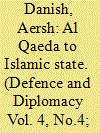

|
|
|
| 2 |
ID:
131043
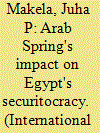

|
|
|
|
|
| Publication |
2014.
|
| Summary/Abstract |
In a 7 March 2012 article in the Washington Post, prominent journalist and Middle East expert David Ignatius wrote that Egypt was sliding toward ruin. 1 His pessimistic assessment was based on the developing security situation, or lack of it. Security was lacking at the street level and beyond. Once the Arab world's most powerful country, Egypt's economy has since been shattered, and its security situation badly deteriorated. Political power struggles continue to rage and the compass of the nation's foreign policy has been lost. Security experts well recognize multiple simultaneous spirals of violence and believe that Egypt is on its way to becoming a failed state.
|
|
|
|
|
|
|
|
|
|
|
|
|
|
|
|
| 3 |
ID:
090325
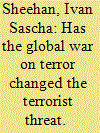

|
|
|
|
|
| Publication |
2009.
|
| Summary/Abstract |
Whether the Global War on Terror (GWOT) has changed the terrorist threat is a matter of controversy. This study, using transnational terrorism events data from 1993 through 2004, employs a time-series approach to investigate the extent to which the onset of the GWOT (beginning with the invasion of Afghanistan) and related events (the invasion of Iraq, the capture of Saddam Hussein, and the release of photos from Abu Ghraib) are associated with changes in transnational terrorist activity, its frequency, dispersion, lethality, type of attack, and type of victim of transnational terrorist incidents.
|
|
|
|
|
|
|
|
|
|
|
|
|
|
|
|
| 4 |
ID:
083933
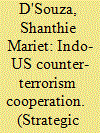

|
|
|
|
|
| Publication |
2008.
|
| Summary/Abstract |
Following the 9/11 attacks on the American homeland, India and Pakistan emerged as important states in the US-led Global War on Terrorism (GWOT). The gathering momentum in the Indo-US relations during the Clinton Presidency underwent a dramatic transformation. Although increased cooperation in defence issues is understood to have 'led' the India-US relationship to its current level, it has not culminated in enhanced counter-terrorism cooperation. This perceived lack of cooperation can be located within the perceptual differences on key security issues. This paper seeks to examine whether the upswing in Indo-US relations and claims of heightened cooperation, has led to a commensurate level of counter-terrorism cooperation between both countries.
|
|
|
|
|
|
|
|
|
|
|
|
|
|
|
|
| 5 |
ID:
090383
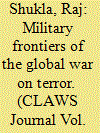

|
|
|
|
|
| Publication |
2008.
|
| Summary/Abstract |
The motivation for unleading the GWOT was obviously 9/11. The military campaign to demolish the Al Qaeda and its Taliban sponsors in Afghanistan, thereafter, was perhaps justified. Widening the swathe of the military onslaught to Iraq, however, was clearly a mistake, especially now that it is abundantly clear that the conflict there had more to do with settling scores with an old foe than with any terror links with 9/11 or weapons of mass destruction (WMD).
|
|
|
|
|
|
|
|
|
|
|
|
|
|
|
|
| 6 |
ID:
138849
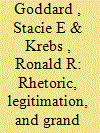

|
|
|
|
|
| Summary/Abstract |
This introductory framing paper theorizes the role of legitimation—the public justification of policy—in the making of grand strategy. We contend that the process of legitimation has significant and independent effects on grand strategy’s constituent elements and on how grand strategy is formulated and executed. Legitimation is integral to how states define the national interest and identify threats, to how the menu of policy options is constituted, and to how audiences are mobilized. Second, we acknowledge that legitimation matters more at some times than others, and we develop a model specifying the conditions under which it affects political processes and outcomes. We argue that the impact of legitimation depends on the government’s need for mobilization and a policy’s visibility, and from the intersection of these two factors we derive five concrete hypotheses regarding when legitimation is most likely to have an impact on strategy. Finally, we explore who wins: why legitimation efforts sometimes succeed in securing public assent, yet at other times fall short. Our framework emphasizes what is said (the content of legitimation), how it is said (technique), and the context in which it is said. We conclude by introducing the papers in this special issue, revisiting the larger theoretical stakes involved in studying rhetoric and foreign policy, and speculating about how changes in the technologies and sites of communication have, or have not, transformed legitimation and leadership in world politics.
|
|
|
|
|
|
|
|
|
|
|
|
|
|
|
|
| 7 |
ID:
085914
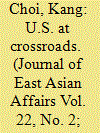

|
|
|
|
|
| Publication |
2008.
|
| Summary/Abstract |
In dealing with the challenges ahead and restoring U.S. leadership in the international community, the U.S. is expected to take different path(s) depending upon who will become the next U.S. president.
|
|
|
|
|
|
|
|
|
|
|
|
|
|
|
|
|
|
|
|
|